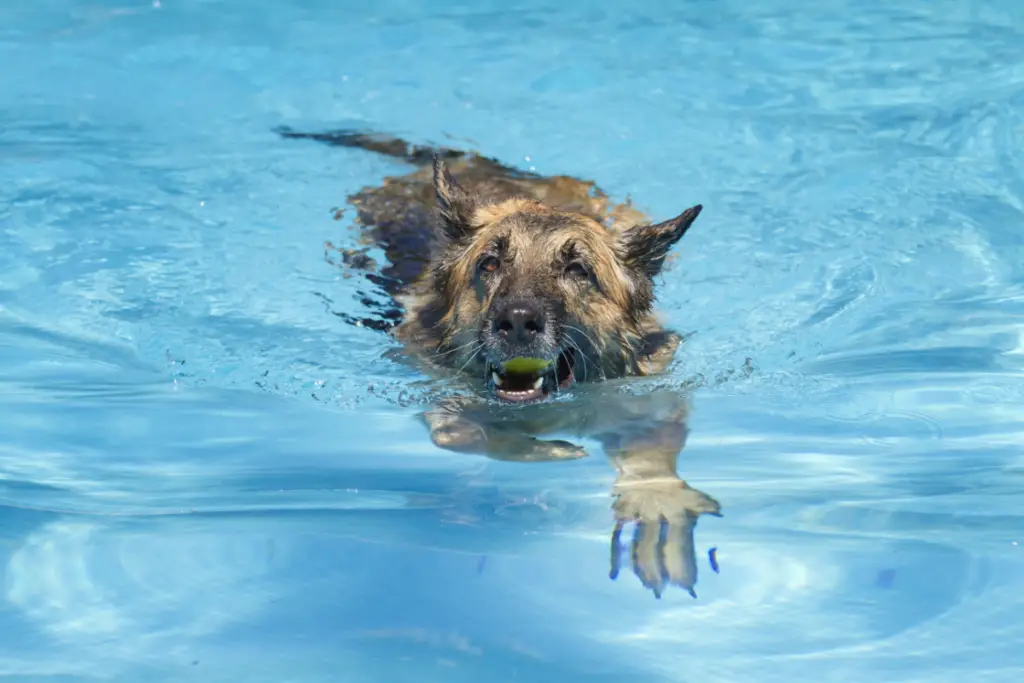German Shepherd Dogs are a smart, energetic breed. But sometimes, they show a stubborn streak that’s hard to break. This can be dangerous when it’s a bad habit like drinking from the pool when they’re not supposed to.
That’s why it’s crucial to learn how to get your German Shepherd to stop drinking pool water. It might take a few tries, but you have to stop this habit from forming, or else your GSD will suffer some health issues.
So read on to find out why pool water is dangerous to drink, even when it’s not chlorinated, and how to stop your GSD from lapping it on occasion.

How To Get My German Shepherd To Stop Drinking Pool Water
There are some steps you can take to prevent your German Shepherd from drinking pool water:
Offer Plenty of Fresh Water
The first and most straightforward reason why your German Shepherd is drinking from the pool is that he or she is thirsty. If your dog likes to play outside near the pool but has no water bowl nearby, rest assured he or she will head for the pool right away.
A nice, big bowl of fresh water should stop this from happening, especially since it tastes better than pool water. If your dog is averse at first, entice him or her with a few ice cubes on a hot day, or a sprinkle of bouillon powder to make the water taste better.
Take the Dog Out of the Pool if He Starts Drinking
If your GSD drinks pool water only while swimming, this might be a little trickier to control. Just pay close attention to the dog and keep him or her on a leash during playtime in the pool. Once he or she starts drinking the water, lead the dog out of the pool and scold him or her gently.
The most important part of this is consistency, because your pup will respond to training when the message is constant and repeated. Playing is okay, drinking is not.
Restrict Access to the Pool when You’re Not Around
This one is super important if you leave your dog to play in the backyard where the pool is when you’re not available to stop him or her. Just keep the dog inside when you can’t monitor his or her movement, and tell other people in the house to avoid letting the dog out.
Doing this won’t only protect the dog from drinking chlorinated pool water, but potentially save his or her life if they fall accidentally into the pool and can’t swim. Even if your dog can swim, he or she might lose balance while leaning in to drink and fail to react in time.
That’s why it’s crucial to have the proper safety measures in place, so that your pooch enjoys a long, healthy life.

Why Is Pool Water Dangerous to Dogs?
A dog drinking from the pool isn’t a rare occurrence, and in most cases, it’s not a big deal. A few gulps while swimming in the pool every now and then probably won’t hurt your dog. But if your pooch goes out of his or her way to drink water from the pool, this could spell trouble because of:
Chlorine
Chlorine is the main detergent that kills and stops the reproduction of any microorganisms that might be present in your pool. It’s important for keeping a safe, sanitary pool that humans and canines can splash around in on a hot summer’s day
However, chlorine isn’t harmless to dogs (and humans), especially if consumed in large quantities. This is less of a problem if you calibrate the amount needed for the pool volume and don’t overdo it, but it can still cause some irritation.
Signs of chlorine toxicity include nausea, vomiting, diarrhea, erosion of the esophagus, as well as lethargy from dehydration caused by the vomiting and/or diarrhea.
This is unlikely to happen to your GSD if he decides to drink pool water just one time, but rather because of consistent irritation to his gastrointestinal tract because of repeated behavior.
A good alternative to chlorine is bromine, just keep in mind it’s more expensive and doesn’t always work for outdoor pools because sunlight breaks it down.
Microorganisms (Blue-green Algae)
If you decide to forgo the chlorine for a more “natural” approach, you’ll probably end up having to drain your pool every couple of days, or else it’ll get colonized by a bunch of microorganisms.
The worst of those freeloaders is blue-green algae, which isn’t actually a true alga, but a type of bacteria called cyanobacteria. If the water gets stagnant enough that it changes color or smells, there’s a huge chance of a high concentration of cyanobacteria.
These can cause acute toxicity that’s often fatal to dogs as well as humans, although dogs are at a higher risk because the smell attracts them. Symptoms include vomiting, diarrhea, and general weakness that might lead to loss of muscle tone.
Water Intoxication
Lastly, drinking from a pool might cause your dog to over consume water, which, in some cases, might lead to water intoxication. This is rare but has a higher chance of happening if your dog was super thirsty and went straight for the pool, or was swimming and ended up ingesting a lot of pool water.
Conclusion
German Shepherds are intelligent, active, and overall great companions. However, they might show behaviors that make you scratch your head. Drinking from the pool is one of those behaviors.
Learning how to get your German Shepherd to stop drinking from the pool can be as easy as putting a bowl of fresh water nearby. Encouraging them with a few ice cubes of a hot day, or some bouillon to flavor the water can also be a great idea.
The rest is just a matter of keeping access to the pool limited when the dog isn’t supervised, as well as taking the dog out of the water if he or she starts drinking it.
